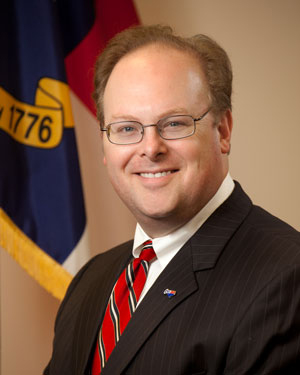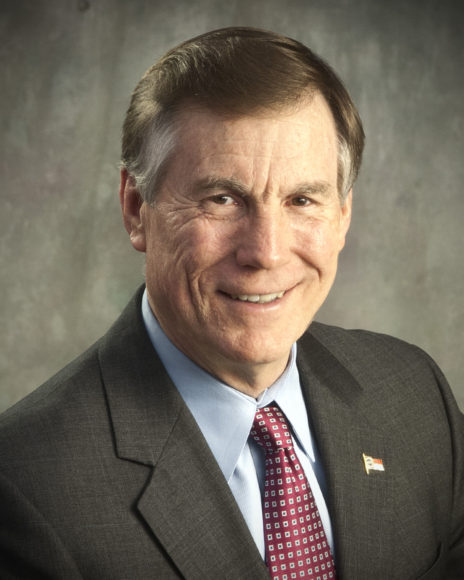The race for the next North Carolina Insurance Commissioner features two familiar faces to state voters in what is a three-peat showdown featuring Republican Mike Causey and Democrat Wayne Goodwin.
Causey, the incumbent, bested the two-term former commissioner Goodwin in 2016 by just over 39,000 votes. In 2012, the two battled it out as well with Goodwin winning by a larger margin – nearly 160,000 votes.
After years of high-profile disputes, it is safe to say there is no love lost between these two candidates.
Calling Causey’s win four years ago an “anomaly,” “thanks to the presidential election,” Goodwin said he is running again because “now more than ever we need an insurance commissioner who is experienced and qualified to be the commissioner.”
Goodwin, a former assistant insurance commissioner, attorney and North Carolina state representative, said Causey’s experience as an agent, registered lobbyist and “fulltime candidate for the last 30 years” doesn’t qualify him to be the state’s top insurance regulator. Causey unsuccessfully opposed former Democratic Insurance Commissioner Jim Long in 1992, 1996, and 2000.
“We need an insurance commissioner who knows insurance law, understands how to run an [government] agency. I spent 29 years … focused on insurance regulator matters and I’ve also been a legislator and understand the legislative process,” he said.
Causey says his experience as an insurance agent has helped him in his commissioner role, noting he is the first non-attorney to be elected as head of the North Carolina Department of Insurance since the position was created in 1899.
“I believe it’s good to have an insurance commissioner that actually has experience in the industry because that’s even more helpful to consumers understanding both sides,” he said.
Goodwin has stayed involved in the industry since leaving office in 2016. He started a government and insurance consulting firm, Seaboard Strategic Consulting, and has remained active with the National Association of Insurance Commissioners (NAIC). In 2017, he was elected as chairman of the North Carolina Democratic Party and was re-elected in 2019.
Causey called Goodwin a “career politician” and criticized him for not stepping down as the state Democratic Party chair while running for office. Goodwin disputed the notion that his chairman role is a conflict of interest as his term ends in 2021, before he would take office if elected.
Goodwin says he would return the department to one that is “based on expertise that is best and right for both consumers and the market.”

Donor Drama
A particular point of hostility between the two candidates and one that has received significant media attention in the last few years is the corruption investigation by the FBI of North Carolina political donor and insurance CEO Greg Lindberg – now serving 7 years in prison for attempts to bribe Causey to secure preferential regulatory treatment for his insurance business. Lindberg has denied the charges and is appealing his convictions.
According to reports, Lindberg gave more than $5 million to state and federal candidates since 2016. Causey worked with authorities in the case against Lindberg, as well as sent a $240,000 donation to the FBI that he received from the state Republican Party, an apparent pass through from Lindberg. A former chairman of the state’s Republican Party is currently on probation for lying to federal agents for his role in the bribery scandal.
A 2019 Wall Street Journal article cited a fundraiser for Goodwin held by Lindberg in 2016 that, between that and other donations, amounted to $125,000 to Goodwin from Lindberg, his employees, business associates and some of their spouses and family members. “Lindberg also created a PAC that purchased ads in support of Mr. Goodwin and gave $425,000 to it, records show,” the Wall Street Journal article states.
Neither Goodwin or Causey were accused of any wrongdoing and both cooperated with authorities in the investigation.
Causey described the experience working with the FBI on the case as “grueling,” and called out Goodwin for either “directly or indirectly” accepting donations from Lindberg.
“I fought corruption and I’ve stood up to the big guys,” he said. “But I’m glad to have done my duty there because I think it was something that needed to be done.”
Goodwin said Causey did what any public servant should do by reporting “anything that seems not right” and disputed Causey’s allegations against him, saying he didn’t have any involvement with or accept any funds from the independent committee formed by Lindberg. Goodwin has also claimed Lindberg got “no special favors” from his office, and on insurance regulatory issues related to Lindberg’s companies, “I relied on the input from subject matter experts.”
“I think it is improper, and frankly appalling, that he would blatantly lie and say I accepted or took money when that’s not true at all,” he said. “[He is] doing anything and everything to hold on to this office, including lying about my record and lying about accepting funds … it’s important the public know that what he is saying is false.”
Candidate Priorities
While the two candidates share various points of contention, particularly on how the department should be run, they say their priorities as commissioner revolve around keeping a healthy insurance marketplace for consumers and the industry.
North Carolina Rate Bureau
When Causey ran in 2016, he made reforming the North Carolina Rate Bureau (NCRB), which represents insurance companies writing property insurance in North Carolina and is not a part of NCDOI, one of his key priorities.
He said he’s worked while in office with the state legislature to “allow insurance companies more flexibility and more free market areas.”

“The political reality in North Carolina is the rate bureau overall has kept a very stable insurance market,” he said.
While some companies would like to get rid of the NCRB, Causey said, “the legislative leadership and the legislators tend to favor the rate bureau, which they created. So, the insurance industry’s divided … I don’t see in North Carolina, the rate bureau going away.”
Causey has worked with NCRB on proposed rate increases and negotiating settlements that were “very favorable to consumers and also a settlement that the insurance companies could live with and not be harmed financially.”
NCDOI was also able to do away with the “consent to rate” wet signature requirement where insureds had to physically sign to accept insurer rates from NCRB, a process Causey called very burdensome for agents.
“The agents don’t have to worry about tracking people down and getting those signatures, and the insurance companies can go ahead and offer it to the policyholder. If the policyholder wants it or not, that’s up to them,” he said.
Goodwin agrees there are components of the rate bureau system in North Carolina that work and the industry is split on keeping or eliminating it.
“My proposal, which we started making these changes during my second term, was incremental reforms so that we would not upset the insurance market here,” he said.
During his time as regulator, Goodwin said he would hear from consumers who were frustrated that certain products were not available in the state because of the rate bureau system, so he worked with experts in the department to implement reforms that gave consumers a choice of products and services that previously had been unavailable.
“The rate bureau needs continued smart, targeted reforms, smart targeted deregulation, but it needs to be in an incremental basis,” he said. “If we went the direction that Mike Causey had espoused up until he became commissioner, our market would have become tremendously unstable. So, my position is the same as it’s always been; his is not.”
Healthcare
Goodwin said if elected, he would return NCDOI to working on what he calls the number one issue in the state and the country right now and one that will be especially critical if the United States Supreme Court strikes down the Affordable Care Act.
“You need an insurance commissioner who knows what he’s doing and can walk and chew gum at the same time,” Goodwin said.
Goodwin said there are 750,000 North Carolinians without access to healthcare that would have access if the state adopted a Medicaid expansion. He also said his legal expertise is important to attracting companies to the state.
“We need someone who will help update the statutes in North Carolina so we can recruit more health insurance companies and have more competition for individual as well as group insurance policies, particularly for the individual policies,” he said.
Causey said since he took office, the state has brought in 345 additional insurance companies with that total including a number of health insurers. He noted that he is concerned about the role of pharmacy-benefit managers and their effect on small business pharmacies.
“I hear from the independent pharmacists and the community pharmacists that the pharmacy-benefit managers are trying to squeeze them out of business,” he said. “So we need to work to save our small businesses and our independent pharmacies … We don’t need the pharmacy-benefit manager to be heavy-handed and take advantage of the little guys.”
Insurance Fraud
For Causey, fighting insurance fraud has been a top priority since he took office and will continue to be if he is re-elected. He said when he came to the department, he learned from its criminal investigators that insurance fraud cases were hard to get through the courts so the department brought in attorneys to work with local district attorneys in prosecuting cases in North Carolina’s 100 counties. In 2019 he established the Criminal Investigations Reserve Unit to combat the extensive number of insurance fraud cases in the state.
Causey also cites on his website that he has worked with the state legislature to double the number of fraud and abuse investigators at the NCDOI.
“We want to put the fraud folks out of business, but we’ve got a long way to go,” he said.
Fraud is an issue Goodwin is also committed to dealing with and touted that while he was in office criminal investigators made more than 1,000 arrests, resulting in over $55 million in restitution and recoveries for victims. He says fraud hasn’t been adequately handled under Causey – claiming it has actually increased since Causey took office.
Flood Insurance
Both candidates agree the last several years of major catastrophes have been devastating to the state and highlighted the need for flood insurance. Causey and Goodwin both said they would work towards establishing a private flood insurance market in North Carolina.
Goodwin said while he was commissioner, he began outreach to parts of the state to increase awareness about flood insurance through conferences and offering continuing education credits to agents that attended, something NCDOI does today.
“We are a coastal state… I talked about the ticking time bomb of coastal homeowner’s insurance that includes the availability of flood insurance. I was involved with the NAIC on how to initiate and grow a private flood insurance market,” Goodwin said.
Causey said he was shocked to learn after Hurricane Florence that less than 135,000 North Carolina families had flood insurance policies and has since traveled the state educating consumers on the need for coverage. He said 10,000 more consumers now have flood insurance in North Carolina since 2018.
Causey has worked closely with NCRB to develop private flood insurance policy forms that have been approved and his goal now is to get insurance companies to begin offering flood coverage in the state by early next year.
“Dependent on the pricing and what the individual insurance companies would like to do, I believe you’ll see in North Carolina private flood insurance policies be offered for sale during 2021. And I think that’s a good thing for consumers,” he said.
Both Causey and Goodwin say they are dedicated to helping the state’s insurance industry move forward.
“Of the two candidates, I would respectfully contend that I am the most qualified, most experienced,” Goodwin said. “As insurance commissioner or in any other role that I’ve had, I seek those roles to help solve problems. And right now, the insurance industry has a number of problems that need addressing. And I’d like to help be a part of that.”
Causey said he wants to continue moving toward a more free-market system “to the extent that we can with our system of regulation. Because I’m a free-market type person, I believe whatever we can do to attract more insurance companies here, the more the better. Competition’s a good thing.”
Topics Carriers Fraud Agencies Legislation Flood North Carolina Market
Was this article valuable?
Here are more articles you may enjoy.



 JPMorgan Client Who Lost $50 Million Fortune Faces Court Setback
JPMorgan Client Who Lost $50 Million Fortune Faces Court Setback  AIG General Insurance Chairman McElroy to Retire May 1
AIG General Insurance Chairman McElroy to Retire May 1  Progressive Gains as Drivers Shop Around for Auto Insurance—Again
Progressive Gains as Drivers Shop Around for Auto Insurance—Again  Investment Funds File New Suits Over Lighthouse Insurance Collapse in 2022
Investment Funds File New Suits Over Lighthouse Insurance Collapse in 2022 

